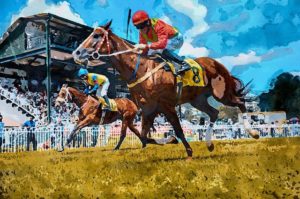What are apprentice and conditional jockeys?
 Apprentice jockeys, in Flat racing, and conditional jockeys, in National Hunt racing, are jockeys aged between 16 and 25 years of age, who have ridden a limited number of winners. To compensate for their lack of experience, in some, but not all, races, they can claim a weight allowance when riding against fully licensed professionals.
Apprentice jockeys, in Flat racing, and conditional jockeys, in National Hunt racing, are jockeys aged between 16 and 25 years of age, who have ridden a limited number of winners. To compensate for their lack of experience, in some, but not all, races, they can claim a weight allowance when riding against fully licensed professionals.
The weight allowance is simply deducted from the weight allotted to the horse due to be ridden by the jockey in question; a horse allotted 9st 7lb, due to be ridden by an apprentice claiming 3lb, would actually carry 9st 4lb, and so on. The only proviso is that if the weight allowance takes the weight allotted below the minimum riding weight of the jockey, he or she is unable to claim the full allowance.
Apprentices with fewer than 95 winners can claim 3lb, thise with fewer than 40 winners can claim 5lb and those with fewer than 20 winners can claim 7lb. Similarly, conditional jockeys with fewer than 75 winners can claim 3lb, those with fewer than 40 winners can claim 5lb and those with fewer than 20 winners can claim 7lb. Additionally, conditional jockeys wih fewer than five winners can claim an extra 3lb, making 10lb in total, when riding for their own stable.